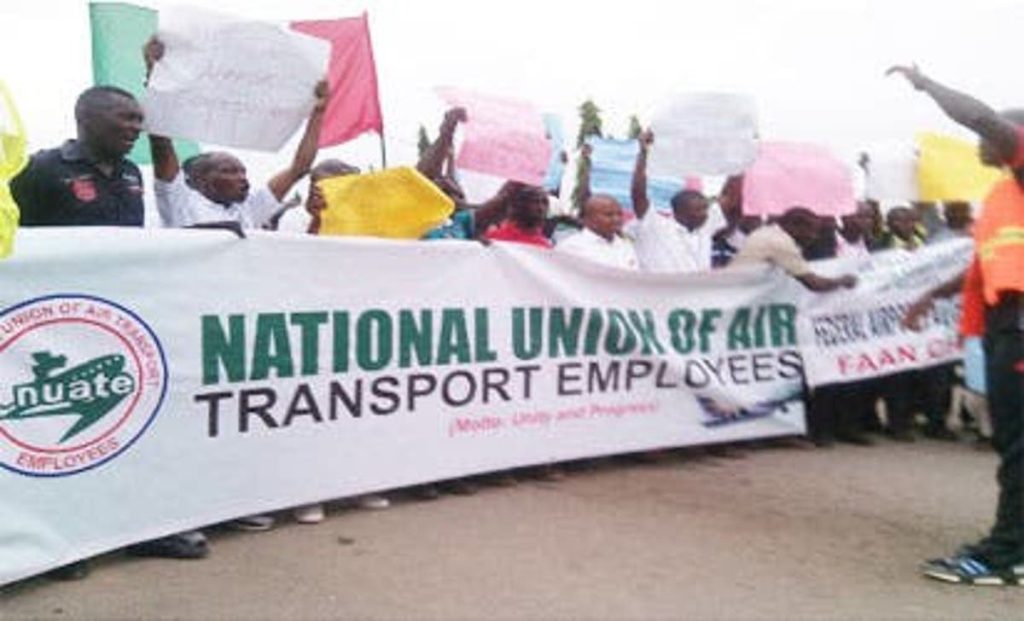Ben Nnabue, President of the National Union of Air Transport Employees (NUATE), voiced serious concerns regarding the safety and security of Nigeria’s aviation industry during the 2025 Workers’ Day celebration in Lagos. At the heart of his address was the continued deduction of 50% of the internally generated revenue (IGR) of federal aviation agencies by the government. This practice, despite previous agreements for review and the detrimental impact on crucial safety and security measures, remains a major point of contention between the unions and the government. The deduction affects even agencies struggling financially, further exacerbating the challenges faced by the aviation sector. Nnabue’s statement highlighted this issue as a significant obstacle to the industry’s orderly growth and development, potentially jeopardizing the safety and well-being of air travelers and workers alike.
The revenue deduction issue is not the only concern plaguing the Nigerian aviation sector. The absence of governing boards for aviation agencies is another pressing matter raised by the union. These boards play a vital role in long-term strategic planning and generating innovative ideas, and their absence creates a leadership vacuum that hinders the agencies’ effectiveness. This lack of direction further complicates the already challenging financial situation caused by the revenue deductions, leaving the agencies ill-equipped to address critical safety and security needs. The union emphasized the importance of these boards in fostering a more stable and progressive environment within the aviation industry.
Furthermore, the conditions of service and remuneration for employees in the aviation sector, particularly within private aviation service providers, remain a significant concern. Although the aviation unions have successfully negotiated revised conditions of service for most public agencies, the timely approval of these revisions by the National Salaries, Incomes and Wages Commission (NSIWC) and the Office of the Head of Service of the Federation (OHSF) remains uncertain. Nnabue stressed the crucial role of the NSIWC and OHSF in ensuring a positive industrial climate within the aviation sector, urging them to expedite the processing of the revised conditions of service. Delays in this process contribute to worker dissatisfaction and potentially impact the overall efficiency and safety of aviation operations.
The troubling case of Turkish Airlines highlights the maltreatment faced by workers in the private aviation sector. Nnabue accused the airline’s General Manager in Nigeria of obstructing staff from joining unions and establishing union offices, a violation of Nigerian labor laws. This action reignites a long-standing conflict between the unions and Turkish Airlines, centered on issues of labor welfare, victimization, and the fundamental right to associate freely, particularly with labor unions. The union’s strong stance against these practices signals a potential showdown with Turkish Airlines and underscores the broader challenges faced by aviation workers in the private sector.
Adding to the list of grievances is the outstanding payment of entitlements to former employees of the defunct Nigeria Airways. Despite assurances from the Ministers of Aviation and Finance, the prolonged delay in these payments continues to inflict hardship on these former workers, many of whom are pensioners. Nnabue expressed deep disappointment over the bureaucratic inertia impeding this process and vowed to engage directly with the Ministry of Finance to expedite the payments and finally resolve this longstanding issue. The union sees the continued delay as a symbol of neglect and a failure to adequately address the legacy of Nigeria Airways.
Finally, the absence of a national carrier remains a major concern for the union. Nnabue emphasized the critical need for a national airline, given the significant demand and potential benefits for Nigeria. He pledged to initiate serious discussions with aviation authorities to push for the establishment of a national carrier. This initiative is seen as vital for boosting the nation’s aviation industry, enhancing international travel connections, and creating employment opportunities. The union’s proactive approach underscores its commitment to addressing the long-standing challenges and promoting the growth and development of the Nigerian aviation sector.














